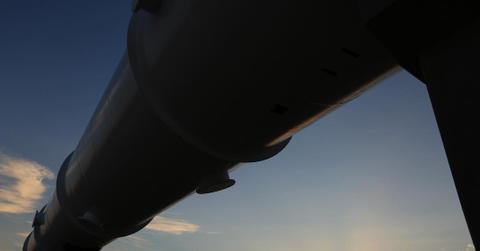Colorado Moves Forward With $24 Billion Hyperloop Project
Virgin Hyperloop One mapped out 10 routes around the world that their underground transportation system could thrive, and Colorado is taking the next steps forward. The state's DOT will study how the project pans out in the first year.
Updated Nov. 19 2020, 9:39 p.m. ET
Ever felt like you were wasting years of your life just sitting in traffic? Don't worry, big changes concerning how we travel on the day to day are in the works. For example, hyperspeed traveling is quickly becoming a reality in Colorado. The state’s Department of Transportation will be going forward with Virgin Hyperloop One in researching the massive underground transportation service that’s estimated to be $24 billion. Both organizations will be looking into the process over nine months with hopes that some routes will be completed in the next four years.
With population estimated to grow 50 percent in Colorado over the next 20 years, the worry is traffic will be further congested in urban areas, especially inside of the greater Denver area. Adding underground travel would decrease the amount of cars on the road, and the alternative transportation would cruise up to 400 miles per hour up and down the state.
Virgin Hyperloop One released 10 different routes that it would study in September. One of them, called the Rocky Mountain Hyperloop, was a route that stretched from Cheyenne, Wyoming down to Pueblo, Colorado. The route would obviously pass through Denver and would hit places like Fort Collins, Greeley, and Colorado Springs. There would also be a westward route that stretches to Vail.
“Moving people rapidly from one place to the next has implications of radically changing how we think about land use, and where people live, and where they work, and how they get between that,” Amy Ford, a spokeswoman for the CDOT, told The Coloradoan. “We cannot build our way out of congestion, and that’s why we’re looking so widely at technology.”
AECOM, an engineering firm in Los Angeles, California, will also be part of the study on hyperloop technology. There’s a good chance that cargo and supplies will be tested with the service first. Not only would this provide a major benefit in the transportation of goods, but it could provide a faster gateway for human travel. The CDOT specifically will be looking into how to get the entire project approved by the federal government.
Obviously, the biggest hurdle is the $24 billion price tag on the potential hyperloop. Massive funding will be required from many sources, and the more logical first step will be a miniature portion of the route being completed. It’s estimated that a 40-mile hyperloop from Greeley to the Denver International Airport would be around $3 billion.
While costs are massive, it has the potential to really boost the economy. The project could bring in as much as $2 billion per year if completed at its target year of 2040. Completing the first portion between Greeley and the DIA would provide a major boost in the beef industry with JBS, one of the leading processors of beef, pork, and lamb in the United States, connected directly to the airport. It would also provide a link with the University of Northern Colorado.
Other areas that could be receiving the hyperloop treatment are the Northeast and West Coast. Elon Musk’s Boring Company could be digging a tunnel from New York City to Washington, DC, and has already broken ground in Los Angeles. In early October, Missouri’s DOT has partnered up and formed the Missouri Hyperloop Coalition. They’ll be raising funds to study how a potential route can work in their state as well.
